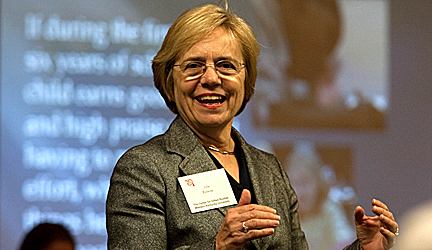
Western Kentucky University

Instructional leaders, have the power to advocate change in their schools or districts. They are the ones who ensure a relevant and rigorous curriculum for all students – including the gifted and talented. Appropriate challenge and continuous progress are the goals. How can administrators facilitate continuous progress? How can they purge one-size-fits-all teaching and stagnation of their high-achieving students? Held for four years, the Administrators Institute provides answers and resources. Participants leave this day-and-a-half institute armed with strategic plans they’ve personally designed for their schools or districts.
References
Archambault, F. X., Jr., Westberg, K. L., Brown, S. W., Hallmark, B. W., Emmons, C. L., & Zhang, W. (1993). Regular classroom practices with gifted students: Results of a national survey of classroom teachers. (Research Monograph 93102). Storrs, CT: The National Research Center on the Gifted and Talented, University of Connecticut.
Duffett, A., Farkas, S., & Loveless, T., (2008). High-achieving students in the era of NCLB. Washington, DC: Thomas B. Fordham Institute. Available on the web athttp://www.edexcellence.net/detail/news.cfm?news_id=732&id=130
Reis, S., & Purcell, J. (1993). An analysis of content elimination strategies used by elementary classroom teachers in the curriculum compacting process. Journal for the Education of the Gifted, 16(2), 147-170.
Westburg, K.L., Burns, D.E., Gubbins, E. J., Reis, S.M., Park, S., & Maxfield, L. R. (1998, Spring). Professional development practices in gifted education: Results of a national survey. The National Research Center on the Gifted and Talented Newsletter, 3-4. Storrs, CT: The National Research Center on the Gifted and Talented, University of Connecticut.
Wyner, J. S., Bridgeland, J. M., & Diulio, J. J. (2010). Achievementrap: How America is failing millions of high-achieving students from lower-income families. Lansdowne, VA: Jack Kent Cooke Foundation. Available on the web atwww.civicenterprises.net/pdfs/jkc.pdf
Dates
November 18, 2010: 8-30 a.m. - 3:30 p.m. CDT
November 19, 2010: 8:30 p.m. - 12:00 p.m. CDT
Location
Carrol Knicely Conference Center
2355 Nasvhille Road
Bowling Green, KY 42101
To download an application for the 2010 Administrators Institute click here.
Some of the links on this page may require additional software to view.